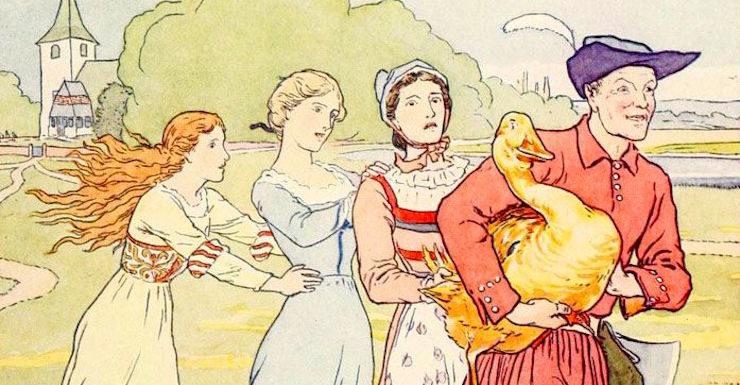Sometimes I’m astonished that so many youngest sons—especially third sons, or seventh sons—make it out of fairy tales alive, or don’t decide to just walk out of the fairy tale, deciding they’ve had enough abuse. I mean, sure, many of them end up married to lovely princesses, ruling over half a kingdom—though given that many of them have also barely met their brides before marriage, and have little to no training in administration, I find myself kinda wondering just how well they’ll do as kings.
And then of course, there’s everything that happens to them in fairy tales, with “The Golden Goose” as perhaps the shining example.
Forgive the pun.
Despite the title, “The Golden Goose,” collected by the Grimm Brothers, is less the story of a golden goose, and more the story of one of those younger sons. He is the third son of a man who seems to be a well off peasant or farmer—poor enough that he needs to ask his sons to bring in firewood, wealthy enough that his wife can feed the sons cake and wine. The son does not have an especially high place in the household, partly because he is only the third son, and partly because—in the eyes of his family, at least—he is not exactly bright. To the point where the family calls him Dummling, or Simpleton, according to the translation.
Which is kinda saying something, given that his two older brothers are not exactly overly bright either. Or at least, not all that overly well versed in fairy tales.
As the story starts, the household needs firewood. Reasonably enough, the father sends out the older son to get some, and the mother provides a very nice lunch of cake and wine. I would have included some protein in that, but maybe wood-chopping really needs to be fueled with alcohol and carbs. Moving on. Before the son can chop any wood, he meets a little old man—possibly a fairy—who asks the son for food. The son points out that he doesn’t have enough food to share, and proceeds to try to chop the tree down—only to cut himself in the leg. That might just be a terrible coincidence—except that the same thing happens to the second son the very next day.
As we’ve noted before, the Grimms, and many of the people they collected their tales from, were quite familiar with hunger, deprivation, poverty, and displacement. The Napoleonic Wars had left portions of their beloved Germany in ruins or near ruins, and they had seen former friends and neighbors reduced to begging for food. They also knew that the Napoleonic Wars had been sparked by the French Revolution, which in turn was sparked at least in part by heavily levels of income inequality. They were also quite familiar with the ideas of Christian charity. Their collection was aimed in part at restoring German values and pride, but also at reminding readers about those ideas of Christian charity. Many of their protagonists are not just pious, but saved by their piety.
And, over and over they emphasized the theme that a lack of charity immediately leads to bad consequences—as here.
Meanwhile, the household still has no firewood, so the third son decides to head out and try to bring some back. No one is enthusiastic about this—his father points out that if his older, wiser brothers failed, he certainly will fail, and his mother provides him with a considerably less excellent lunch. Maybe she just doesn’t like him as well, or maybe the lack of wood means that baking is no longer really an option, or maybe she’s trying to discourage him from going. It’s not entirely clear, but the son heads out anyway with the sour beer instead of the nice wine, and runs into the old man.
This time, things go a little bit differently—the son agrees to split his not very nice lunch with the old man, possibly because it isn’t very nice, or possibly because he remembered what happened to his older brothers when they refused. Or, maybe Simpleton is just the sort of guy that shares things. In any case, they have a nice lunch together, and the old man points him at a very specific tree to cut down for firewood. Simpleton cuts down the tree—and finds a golden goose. And, in further proof that he is perhaps not exactly the simpleton his parents have nicknamed him, he immediately decides not to take the goose home.
True, his family at home still have no firewood, which presumably means they also won’t have any nice cakes, either, but the story is about to completely forget about all of them so we might as well too.
Instead, Simpleton takes himself and the goose out to an inn, though, I gotta ask: given that just a few hours before all he had was a poor quality cake and some sour beer, how exactly is he paying for this stay? Or did he figure that just waving around a golden goose would be enough? Or did he decide to pay for the night with a golden feather, which seems worth considerably more than an overnight stay at a single village inn? Possibly, or possibly not, since when the innkeeper’s three daughters see the goose, they are all, WOW, GOLDEN GOOSE WE SO NEED A FEATHER, which does suggest they would have happily taken golden geese feathers in payment but is perhaps not the reaction they would have had if Simpleton had sauntered in distributing golden goose feathers.
First the oldest, then the second oldest, then the youngest girl all try to touch the goose—ending up with the oldest sister stuck to the goose, her sister stuck to her, and the youngest sister stuck to her—a misery that lasts into the next morning, and even beyond, as the sisters find themselves forced to follow Simpleton and the goose. This horrifies a parson, a sexton, and two labourers, all of whom find themselves forced to follow Simpleton and the goose—right up to the window of a princess who has never laughed, a situation either so serious, or so unfixable, that her father has promised to marry her to the first man who can make her laugh. (The story is silent about what would happen if this person were not a man, but a woman.) The princess sees the people attached to the goose—and laughs.
Some versions of the story end here, with Simpleton marrying the princess, and, the tale assures us, if not very convincingly, living happily ever after. Other versions, presumably realizing that watching a bunch of people stuck to a goose is not exactly the most stable basis for a happy marriage, continue on with either the king or the princess demanding that Simpleton perform more tasks. Like, for instance, finding someone who can drink the contents of an entire cellar of wine. I rather think that some time limit should be placed on this—like, say, drink the contents in a single evening—and that the king should probably ensure that this is a cellar filled with cheap wine, but rather than haggle over details like this, Simpleton heads out to the forest and that tree stump, and—amazingly enough—just happens to find a man whose thirst cannot be quenched.
Real talk, everyone: unquenchable thirst can be a symptom of a serious medical illness. Persons suffering from constant thirst despite drinking more than adequate amounts of water should seek competent medical attention, not random advice from strange elderly men in the forest, much less social climbers nicknamed Simpleton. End real talk.
Even that sign of magical assistance isn’t enough, with Simpleton tasked next with finding a man who can eat a mountain of bread, and then with finding a ship that can sail on land and water. The first task makes me wonder: just how much excess bread does this king have, and surely, wouldn’t it be a better idea to use this bread to entice some geese to show up and maybe drop a golden egg or two than to use it for a rather odd test of husband worthiness. But eventually, the king realizes that just maybe a son-in-law with the ability to find people who can drink cellars of wine and eat mountains of bread, and ships that sail on land and water, is a valuable thing after all—and welcomes Simpleton to the family.
I just hope that Simpleton was content to have a very serious wife. I mean, it would be nice to think that this entire incident sparked a new love for comedy and clowns in her, but she was a serious sort before all this, and presumably will be a serious sort afterwards.
Buy the Book


Finding Baba Yaga: A Short Novel in Verse
The story never does clarify whether the various people ever got detached from the goose, or if they were doomed to stay attached to the goose—and each other—until they died, unless they agreed to have their hands cut off, something that seems rather harsh, especially for the last two people in line, who were only trying to save the sexton and the parson. Maybe they were freed once Simpleton and the princess got married. Or maybe, they spent the rest of their lives—or at least, the rest of the goose’s life—in the palace, trotted out as entertainment whenever the princess needed a laugh, or needed to explain why, exactly, she’d married a guy whose chief qualifications for the throne seemed to be meeting the right fairy people in the woods, sharing pancakes with them, and carrying golden geese.
It’s an odd touch in a fairy tale that otherwise seems focused on reassuring the belittled, the youngest, and the underestimated that yes, they can and will make their fortunes someday—especially if they embrace the virtues of kindness and generosity. Sure, I suppose we could argue that the three daughters deserved some sort of punishment for trying to steal those golden feathers, and I suppose the men deserved some sort of inconvenience for not listening to the girls, and later the parson and sexton screaming “GO AWAY!” But still. Getting laughed at by a princess who never laughed at anything before seems humiliating enough.
Andrew Lang collected “The Golden Goose” in his The Red Fairy Book (1890), helping popularize the tale for a wider English-speaking audience. The story really took off, however, not in fairy tale collections, but in picture books, often combined with other tales of golden geese, where the main scene of seven people getting tugged along by a goose provided illustrators with endless fun. It helped, too, that despite my concerns about the people attached to the goose, and the leg injuries incurred by the older brothers, by fairy tale standards, this is a positively gentle tale, with comparatively limited death and mayhem, and no one overly punished.
Except perhaps for those poor people attached to the goose.
Let’s hope they had the sense to give a few pancakes away as well.
Mari Ness lives in central Florida.










